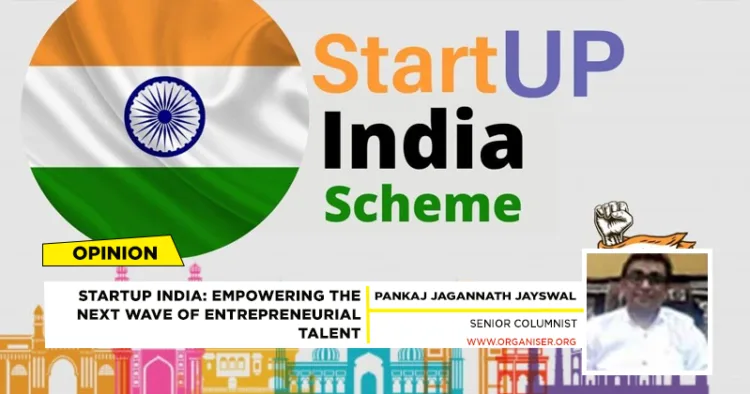The nation prospers when the mindsets of young people and government policies prioritize job producers over job seekers. This is exactly what the Modi government has been doing through various programs and policies over the last ten years. The New National Education Policy, Start Up India, Skill India, and other similar policies are being established to improve youths’ research and innovative talents, knowledge, skills, and entrepreneurship. Let’s look at how the Start Up India initiative has evolved over the previous nine years under Prime Minister Modi.
India is celebrating nine years of Startup India, a transformational journey that began in 2016. National Startup Day commemorates the nation’s progress in cultivating a healthy and inclusive business ecosystem. Startup India, launched as the Government of India’s flagship initiative, aims to foster creativity and accelerate the growth of entrepreneurs across the country.
With over 1.59 lakh firms recognised by the Department for Promotion of Industry and Internal Trade (DPIIT) as of January 15, 2025, India has solidified its position as the world’s third-largest startup ecosystem. This robust ecosystem, led by over 100 unicorns, is redefining innovation and entrepreneurship on a global scale. Major centers like as Bengaluru, Hyderabad, Mumbai, and Delhi-NCR have spearheaded this shift, while smaller cities have increasingly contributed to the country’s entrepreneurial drive. Fintech, edtech, health-tech, and e-commerce startups have overcome local hurdles to achieve worldwide prominence. Companies such as Zomato, Nykaa, and Ola demonstrate India’s shift from job seekers to employment producers, which drives economic growth.
Key Milestones of Startup India
Over the last nine years, the Startup India initiative has played a critical role in developing the country’s robust entrepreneurial ecosystem. It has accomplished tremendous milestones by encouraging innovation and inclusivity, demonstrating its impact on the Indian economy and society. The number of DPIIT-recognised startups has increased from approximately 500 in 2016 to 1,59,157 as of January 15, 2025. As of October 31, 2024, 73,151 recognised businesses had at least one female director, demonstrating the increase of women entrepreneurs in India. From 2016 to October 31, 2024, recognized startups reportedly created over 16.6 lakh direct jobs, making a major contribution to employment generation.
Key Features of the Startup India Initiative
Ease of Doing Business: Simplified compliance, self-certification, and single-window clearances simplify processes for entrepreneurs.
Tax Benefits: Eligible startups are exempt from paying taxes for three consecutive fiscal years. The ₹10,000 crore Fund of Funds for Startups (FFS) provides finance for startups in their early stages.
Sector-Specific Policies: Focused policies in sectors such as biotechnology, agriculture, and renewable energy promote targeted growth.
Industry-wise Jobs Created by Startups
Startups provide jobs in specific industries. The IT Services industry leads with 2.04 lakh jobs, followed by Healthcare & Lifesciences (1.47 lakh jobs) and Professional & Commercial Services (94,000 jobs). These contributions emphasize the importance of startups in stimulating economic growth and offering diversified job opportunities across industries.
Other initiatives under Startup India
The Startup India project provides support to businesses through a variety of initiatives targeted at increasing capacity, promoting outreach, and improving ecosystem engagement. These initiatives ensure the creation of a robust and inclusive entrepreneurship climate throughout India.
International Exposure and Linkages
India’s G20 Presidency established the Startup20 Engagement Group to promote global economic engagement. Meetings held across the country highlighted India’s regional startup ecosystems, boosting worldwide exposure. Government-to-government connections, participation in global forums, hosting international events, and developing bridges with other countries have all aided cross-border collaboration.
Encouraging Ecosystem Collaboration
The Startup India Hub portal provides a complete digital platform for entrepreneurial ecosystem stakeholders. It gives access to resources, information, and benefits offered by the initiative, assuring inclusivity by boosting accessibility for startups and entrepreneurs, particularly those living outside metropolitan areas.
BHASKAR: Empowering India’s Startup Ecosystem
In addition to the aforementioned measures, the Department for Promotion of Industry and Internal Trade (DPIIT) created the Bharat Startup Knowledge Access Registry (BHASKAR) platform in September 2024. This cutting-edge initiative, part of the Startup India program, seeks to consolidate and streamline interactions in India’s entrepreneurial ecosystem. BHASKAR aims to stimulate innovation, collaboration, and growth by linking startups, investors, mentors, service providers, and government organisations, in line with India’s objective of being a global leader in entrepreneurship.
Startup Mahakumbh: Driving Innovation
The Startup Mahakumbh is a flagship event that brings together startups, unicorns, soonicorns, investors, industry leaders, and ecosystem players in one location. It highlights India’s entrepreneurial spirit and technological capabilities, while also encouraging dialogue to develop the country’s startup ecosystem. The inaugural edition in 2024 established a spectacular precedent, with over 1,300 exhibitors spread across ten thematic pavilions. It attracted an incredible number of over 48,000 corporate visitors and became a dynamic magnet for innovative ideas and meaningful collaborations.
The conference attracted 392 prominent speakers, including unicorn founders, visionaries, policymakers, and influencers, as well as 5,000 delegates and more than 200 top investors, venture capitalists, and family offices. The Hon’ble Prime Minister Shri Narendra Modi attended the event, delivering an encouraging speech and touring the exhibition, highlighting the significance of Startup Mahakumbh in India’s entrepreneurial scene. The second edition, scheduled for April 3-5, 2025 at Bharat Mandapam in New Delhi, is expected to outperform expectations with the subject “Startup India @ 2047 – Unfolding the Bharat Story.” This futuristic theme seeks to investigate the future of India’s startup ecosystem as the country strives to become a global hub of innovation by 2047.
To summarize, as India marks the ninth anniversary of the Startup India initiative, the country’s entrepreneurial scene has seen a remarkable metamorphosis. With over 1.59 lakh DPIIT-recognised firms and an expanding workforce, India has cemented its position as a global hub for innovation and entrepreneurship. The initiative’s flagship initiatives, capacity-building activities, platforms like BHASKAR, and events like Startup Mahakumbh have empowered businesses in a variety of industries and areas, including non-metropolitan cities. As India strives to become a global innovation leader, the Startup India initiative remains an important economic engine, creating an inclusive and thriving entrepreneurial ecosystem.




















Comments